La sixième édition du Printemps du CEIB aura lieu cette année entre le 19 et le 22 mars 2024, au sein de la Maison de la Recherche (INALCO, Auditorium Dumézil), de l’EHESS (Campus Condorcet, Salle A327) et de la Maison de l’Asie (Grand Salon).
En ouverture, sera organisée la « Lin Li-kouang distinguished lecture for Buddhist studies » du CEIB, au cours de la matinée du mardi 19 mars (10h-12h). Cet événement inaugural sera l’occasion d’écouter le professeur Katherine Bowie (University of Wisconsin-Madison) qui interviendra aussi dans le cadre du Séminaire « Anthropologie du bouddhisme » de Nicolas Sihlé (CNRS/CESAH), le vendredi 22 mars (10h30-12h30). Durant cette nouvelle édition du Printemps du CEIB 2024, nous écouterons également Guido Sprenger (Université de Heidelberg, professeur invité de l’EHESS) dans le cadre du Séminaire « Anthropologie comparée de l’Asie du Sud-Est », coordonné par Vanina Bouté (EHESS/CASE), Yves Goudineau (EFEO/CASE) et Catherine Scheer (EFEO/CASE).
Le printemps du CEIB aura donc lieu cette année au cours de la troisième semaine du mois de mars (du 19 au 22 mars), consacrant le lancement des activités scientifiques du Centre d’Etudes Interdisciplinaires sur le Bouddhisme en 2024, lesquelles se prolongeront entre avril et juin en une série de huit conférences internationales, comprenant la Semaine d’études sur le bouddhisme chinois (du 22 au 26 avril 2024), et une journée d’étude.
Le Printemps du CEIB est donc divisé cette année en trois événements distincts qui se tiendront sur quatre jours, les 19, 21 et 22 mars 2024. Un lien d’inscription est disponible à la fin de ce post.
Programme :
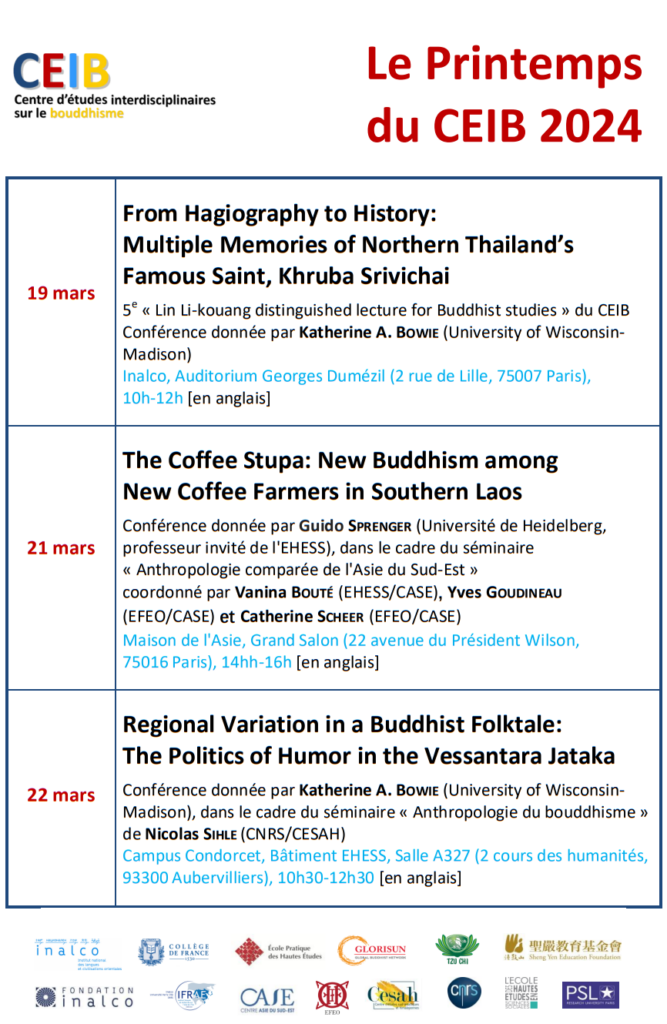
Affiches des événements :
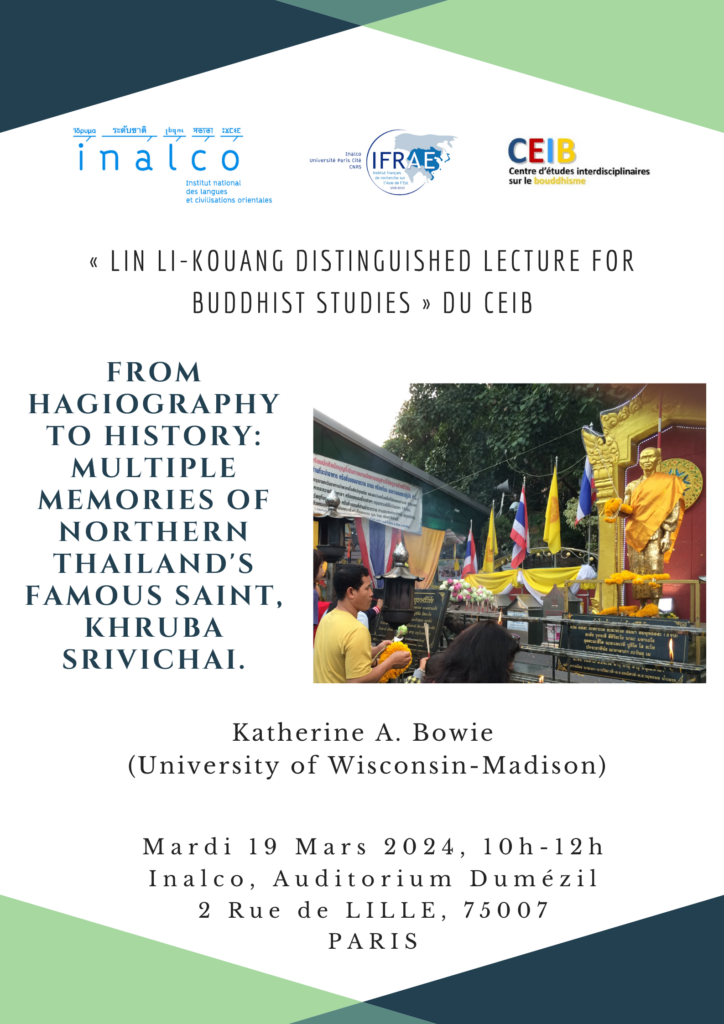
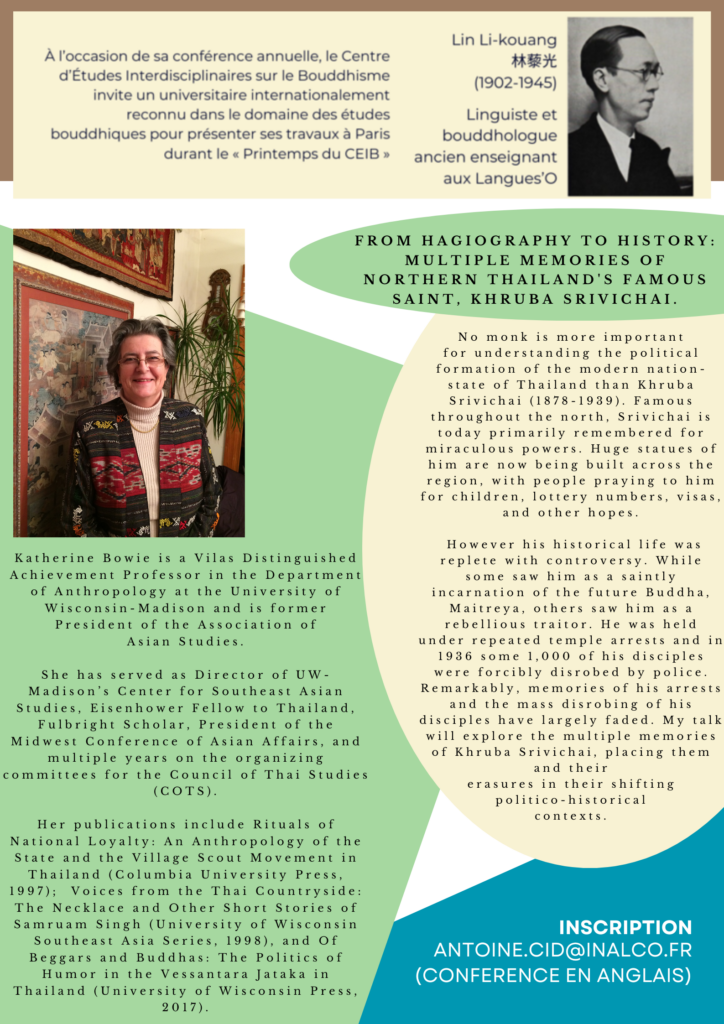
Abstract: From Hagiography to History: Multiple Memories of Northern Thailand’s Famous Saint, Khruba Srivichai
No monk is more important for understanding the political formation of the modern nation-state of Thailand than Khruba Srivichai (1878-1939). Famous throughout the north, Srivichai is today primarily remembered for miraculous powers. Huge statues of him are now being built across the region, with people praying to him for children, lottery numbers, visas, and other hopes. However his historical life was replete with controversy. While some saw him as a saintly incarnation of the future Buddha, Maitreya, others saw him as a rebellious traitor. He was held under repeated temple arrests and in 1936 some 1,000 of his disciples were forcibly disrobed by police. Remarkably, memories of his arrests and the mass disrobing of his disciples have largely faded. My talk will explore the multiple memories of Khruba Srivichai, placing them and their erasures in their shifting politico-historical contexts.
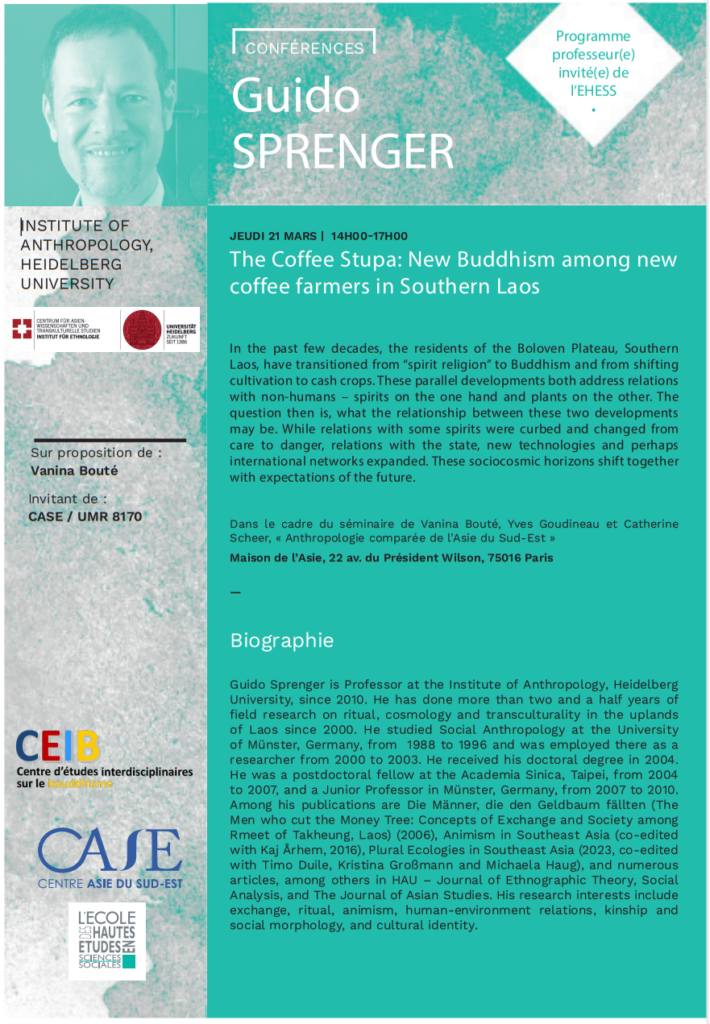
Abstract : The Coffee Stupa: New Buddhism among new coffee farmers in Southern Laos
In the past few decades, the residents of the Boloven Plateau, Southern
Laos, have transitioned from “spirit religion” to Buddhism and from shifting
cultivation to cash crops. These parallel developments both address relations
with non-humans – spirits on the one hand and plants on the other. The
question then is, what the relationship between these two developments
may be. While relations with some spirits were curbed and changed from
care to danger, relations with the state, new technologies and perhaps
international networks expanded. These sociocosmic horizons shift together
with expectations of the future.
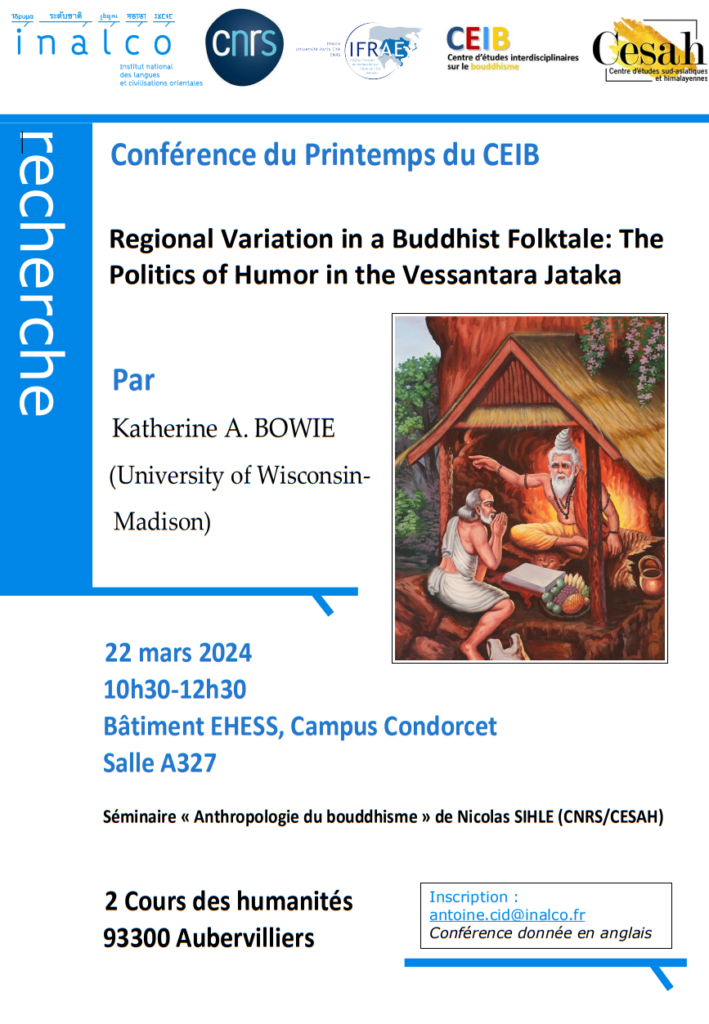
Abstract: Regional Variation in a Buddhist Folktale: The Politics of Humor in the Vessantara Jataka
The meanings of folktales change over time. The Vessantara Jataka is the most famous of the hundreds of morality tales (jatakas) about the Buddha’s previous lives and was once better known among Buddhists than the Gautama Buddha’s historical life. In his birth as Prince Vessantara, the Buddha perfects the virtue of generosity by giving away not only all his possessions, but also his wife and children. In this talk Bowie highlights significant variations in the Vessantara Jataka’s interpretations across three regions of Thailand over the past 150 years. Exploring the ribald anti-royalist trickster humor of the beggar, Bowie considers the differential role of the court in suppressing comedic recitations across these regions in the 19th century. She concludes by noting the transformation of the story’s former emphasis on generosity to one celebrating prosperity as Thailand develops from a feudal into a capitalist society in the modern era.
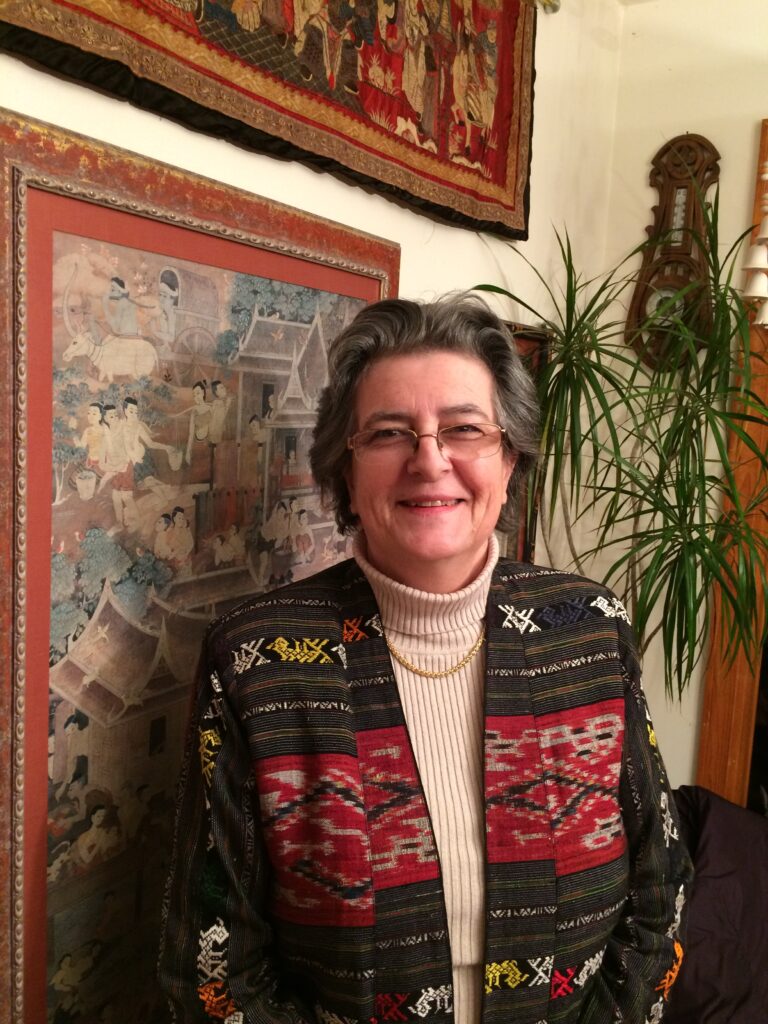
Bionote: Katherine Bowie is a Vilas Distinguished Achievement Professor in the Department of Anthropology at the University of Wisconsin-Madison and is former President of the Association of Asian Studies. She received a BA with Distinction from Stanford University and her MA and PhD from the University of Chicago. She has served as Director of UW-Madison’s Center for Southeast Asian Studies, Eisenhower Fellow to Thailand, Fulbright Scholar, President of the Midwest Conference of Asian Affairs, and multiple years on the organizing committees for the Council of Thai Studies (COTS). Her publications include Rituals of National Loyalty: An Anthropology of the State and the Village Scout Movement in Thailand (Columbia University Press, 1997); Voices from the Thai Countryside: The Necklace and Other Short Stories of Samruam Singh (University of Wisconsin Southeast Asia Series, 1998), and Of Beggars and Buddhas: The Politics of Humor in the Vessantara Jataka in Thailand (University of Wisconsin Press, 2017). Her articles have appeared in such journals as American Anthropologist, American Ethnologist, Journal of Asian Studies and Comparative Studies in Society and History.

Bionote: Guido Sprenger is Professor at the Institute of Anthropology, Heidelberg University, since 2010. He has done more than two and a half years of field research on ritual, cosmology and transculturality in the uplands of Laos since 2000. He studied Social Anthropology at the University of Münster, Germany, from 1988 to 1996 and was employed there as a researcher from 2000 to 2003. He received his doctoral degree in 2004. He was a postdoctoral fellow at the Academia Sinica, Taipei, from 2004 to 2007, and a Junior Professor in Münster, Germany, from 2007 to 2010. Among his publications are Die Männer, die den Geldbaum fällten (The Men who cut the Money Tree: Concepts of Exchange and Society among Rmeet of Takheung, Laos) (2006), Animism in Southeast Asia (co-edited with Kaj Århem, 2016), Plural Ecologies in Southeast Asia (2023, co-edited with Timo Duile, Kristina Großmann and Michaela Haug), and numerous articles, among others in HAU – Journal of Ethnographic Theory, Social Analysis, and The Journal of Asian Studies. His research interests include exchange, ritual, animism, human-environment relations, kinship and social morphology, and cultural identity.
Informations pratiques
Dates : Les 19, 21 et 22 mars 2024
Lieu :
- Inalco, Auditorium Georges Dumézil (2 rue de Lille, 75007 Paris)
- Maison de l’Asie, Grand Salon (22 avenue du Président Wilson, 75016 Paris)
- EHESS, Campus Condorcet, Salle A327 (2 cours des humanités, 93300 Aubervilliers)
Contact : Antoine Cid

Laisser un commentaire